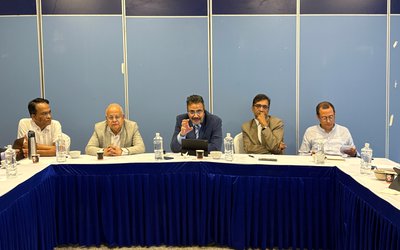
As the protest by teachers in Kathmandu enters its second week, there are concerns about the implications for the upcoming final higher secondary exams.
The National Examination Board and Ministry of Education are calling on teachers to support the Grade 12 exams, but the Teachers' Federation is standing firm in their refusal to cooperate until their demands are addressed. The strike, which began peacefully on Magh 20, has escalated, putting the academic future of 550,000 students at risk. "
The government left us with no choice but to cancel the Grade 12 exams. Our peaceful protest fell on deaf ears," said Somnath Giri, president of the Nepal Teachers' Association, leading the protest on behalf of the Teachers' Federation.
The National Examination Board has stressed that the Grade 12 exams cannot be conducted without the participation of community school teachers.
Mahashram Sharma, chairman of the National Examinations Board, highlighted the significant impact on the future of approximately 550,000 students if there is a delay in the exams. There is a noticeable increase in the number of students in Nepal opting to pursue higher education abroad after completing Grade 12.
Officials are concerned that any delay in the Grade 12 exams could hinder students' admission to domestic and international universities that operate on fixed schedules.
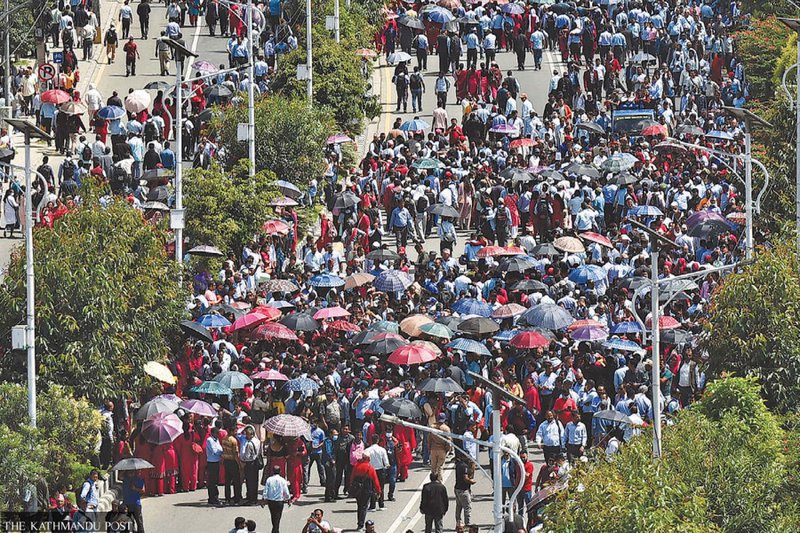
Sharma emphasized the significance of timely completion ofschool-level exams, especially those related to university admissions."
Sharma, the Examination Board Chairman, expressed optimism that the Nepal government and the Teachers' Federation will come to an agreement, allowing the exams to proceed as scheduled. He emphasized the importance of not halting exams, even amidst the challenges posed by the COVID-19 pandemic. Sharma pointed out that previous
Grade 12 exams were disrupted in 2063 BS during the 'Second People's Movement', in 2072 BS due to the earthquake, and in 2077 BS because of the pandemic.
The National Examination Board has emphasized the importance of community school teachers' participation in conducting the Grade 12 examination. According to
Sharma, the chairman of the examination board, a substantial number of teachers and staff, including supervisors and invigilators, are necessary for the successful administration of the Grade 12 exam. He stressed that the involvement of community school teachers is crucial for the exam to be conducted effectively.
Sharma highlighted the need for collaboration between teachers from both community and institutional schools, stating that it is a collective responsibility. He expressed concerns about solely relying on institutional schools for exam administration if community school teachers do not participate, emphasizing the importance of a joint effort.
The government is facing a challenge with the increasing number of students going abroad and the rising amount of money leaving the country. To address this issue, the government should implement measures to retain students within the country.
This could include improving the quality of education, offering more opportunities for higher education and skill development, and creating a conducive environment for students to pursue their academic and career goals domestically.
By investing in education and creating attractive opportunities for students, the government can help curb the trend of students going abroad.
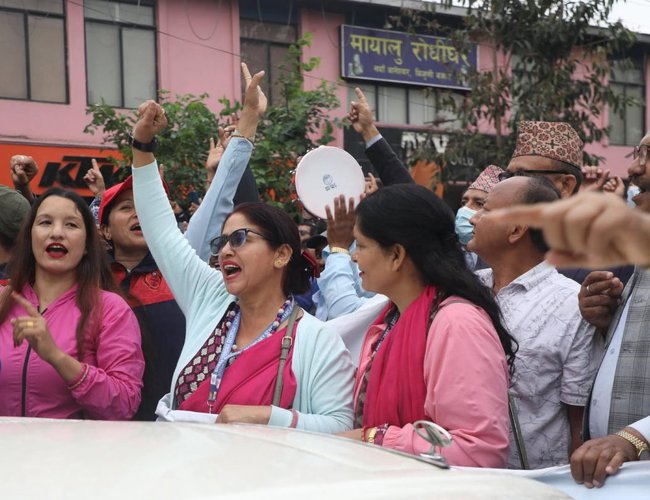
Teachers are adamant that they will not return to school until the School Education Act is passed. Giri said that even if the new academic session begins, they will not return without the Act.
The Education Act bill, which teachers are demanding, has not been finalized by Parliament for the past 18 months.
"We will go if [Parliament] is called, if the government is to make a decision, if it is to be issued," he said. Teachers say they will not disrupt the exams.
"Rather than not allowing the exams to be held, we have called on all teachers and students to not participate in all educational activities and come to Kathmandu, so our support is non-existent. If the government does it through some means, it does not mean that we will not allow the exams to be held," says Giri.
What is the solution? Educationist Prof. Vidyanath Koirala believes that both the government and the examination board should work together to resolve the teachers' agitation.
"We should take the initiative to resolve the teachers' agitation and then tell them, 'These are the ones who will be conducting the examinations, these are the ones who will be marking the copies.' Instead, we should say, 'Let us think about it,'" says Koirala.
According to him, there is a possibility that an agreement can be reached with some changes to the draft seven-point agreement recently prepared by the Ministry of Education.
"If there is an agreement to present the Education Act in the upcoming parliament, the teachers' movement will end. After that, the teachers' demands will be met and the way will be paved for the passage of the Act," says Koirala.
Koirala suggests that former Prime Minister Pushpa Kamal Dahal, who is also the leader of the opposition party, as well as Prime Minister KP Sharma Oli, Nepali Congress President Sher Bahadur Deuba, and the current and former education ministers should make a commitment to the act and take the initiative to return the protesting teachers to school.
Teachers continuing their protest
The government on Tuesday decided to summon the session of the Federal Parliament for April 25, with the aim of passing the long-pending School Education Bill.
Considering the Kathmandu-centric protest of schoolteachers under the Nepal Teachers’ Federation for a fortnight, the meeting of the Council of Ministers decided that the government would coordinate and facilitate the process to get the bill approved through parliament.
However, despite the government’s assurance and calls for cooperation, the teachers continued their protest for 15 consecutive days on Wednesday.
Since April 2, thousands of community school teachers from across the country have been staging street protests in Kathmandu, demanding endorsement of the School Education Bill and implementation of all the past agreements.
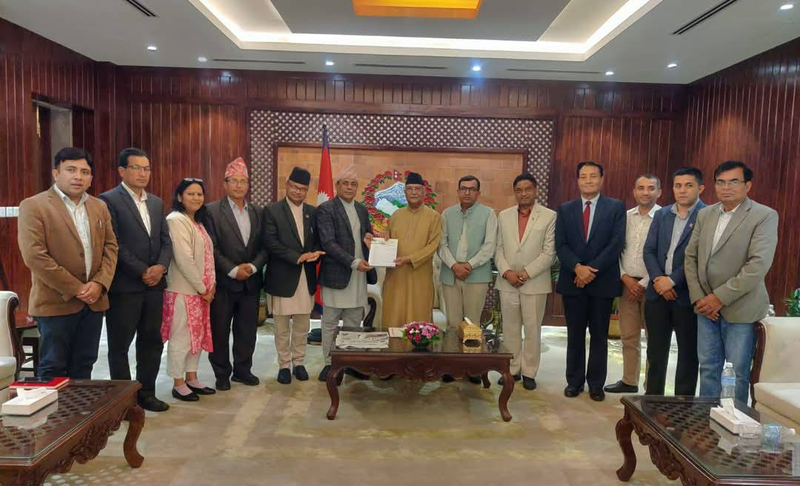
They have been staging the protest by defying the government’s instruction to begin students’ enrollment for the new academic year starting from Tuesday.
However, Minister for Education Bidya Bhattarai reiterated the government’s commitment to addressing the legitimate demands raised by the Nepal Teachers’ Federation through continued dialogue. Minister Bhattarai said that Tuesday’s Cabinet meeting decided to address the demands of the agitating teachers.
“The government has agreed to summon the parliamentary session and coordinate and facilitate the smooth passage of the School Education Bill, in line with their demands,” she said.
According to her, the School Education Bill is under consideration at the Education, Health and Information Technology Committee of the Parliament. “The committee has been regularly holding discussions on the Bill.”
“We are in regular discussions with the teachers, and the Ministry is working to form a facilitation committee to create a conducive environment for dialogue and resolve the issue,” said Minister Bhattarai.
She also expressed concerns over the ongoing protest organised during the time of student enrollment, and when the SEE answer sheets have to be evaluated. Again, the board exams of Grade 12 is beginning on April 24.
Despite the government’s decision to convene the session of Parliament, the Federation remains skeptical.
They are uncertain whether the session will effectively resolve their demands and bring an end to the protests. Federation Chairman Laxmi Kishore Subedi said they were skeptical about the government’s intention the government.
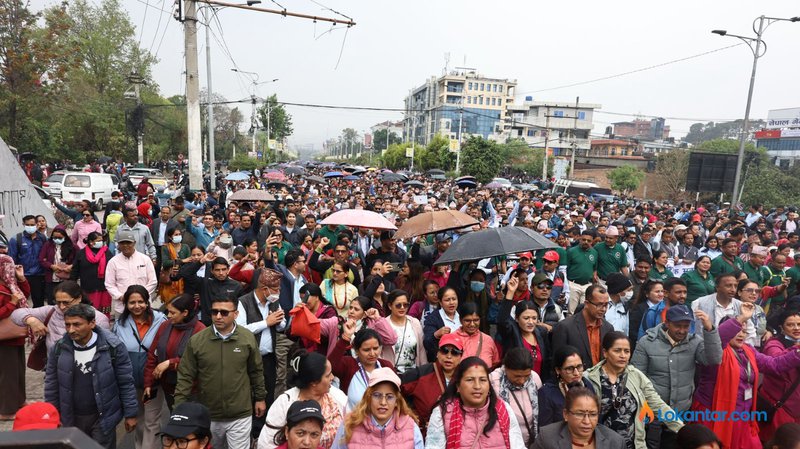
“Merely calling a House session will not resolve our issue. If it could, the four previous sessions of the Parliament would have passed the Bill. We are fed up with endless dialogues and meetings. Now, we want to sit down for talks with the officials who can address our concerns,” he said.
Stating that the movement has reached a decisive phase, Federation chairman Subedi has called on all protestors across the country to reach Kathmandu immediately.
“We have not reached a decisive point. The state continues to show an indifferent attitude towards our demands. Therefore, we have no option but to push the movement forward with a greater commitment and participation,” he said.
“They were creating false narratives that we were avoiding talks and dialogues. That was not the case. Now, we want talks at the Prime Ministerial level, with the involvement of the partner political parties,” he said.
The government has urged all teachers to return to their workplace in the best interest of students and guardians.
The ministers and ruling party leaders have been claiming that the government is serious and sensitive regarding the concerns of the teachers and is ready to make appropriate decisions accordingly.
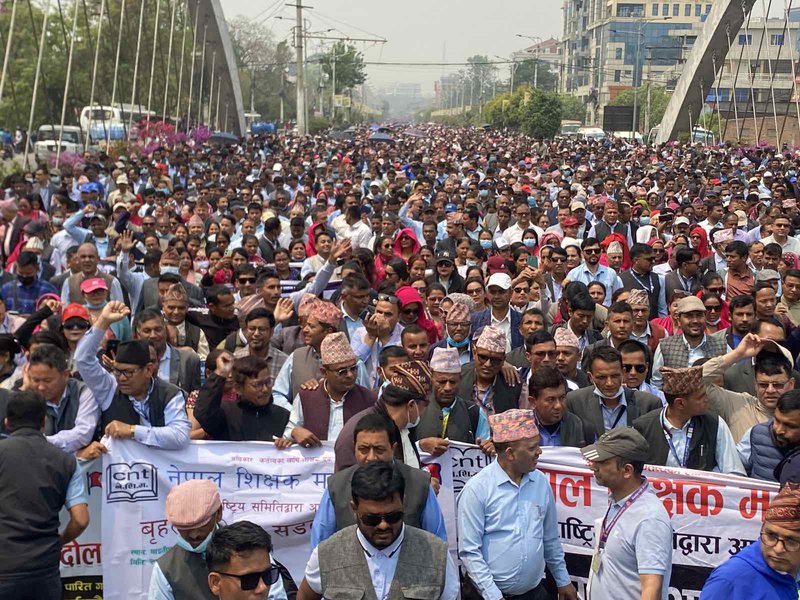
Stakeholders are worried that the continued disruption could delay crucial academic activities, including the Secondary Education Examination (SEE) results, the Grade 12 board examinations, and new student enrolments.
The Federation on Monday reaffirmed its call for school headmasters and teachers to abstain from all official duties. This includes exam paper evaluation, publishing results, new admissions, training sessions and involvement in academic events such as seminars and educational tours.
The ongoing protest also casts uncertainty over the grade 12 board exams, scheduled to start on April 24. The Federation has instructed exam centre chiefs and invigilators to withdraw from examination duties unless their demands are addressed.
While two rounds of talks have taken place with the Ministry of Education, the Federation accuses the government of lacking commitment to resolving their concerns, leading to the continued intensification of their protest.
The federation has been warning that it will escalate to stronger protests if the government fails to address their demands through peaceful demonstrations.
What are the demands of teachers?
The agitating community school teachers have been demanding an increase in salary of Early Childhood Development facilitators, determination of the order of precedence for teachers, add provision of an inflation allowance to school employees.
Similarly, the teachers have been demanding assurance of medical allowances for temporary teachers and equal benefits to teachers as civil servants, including gratuity or pension options for teachers’ families after 15 years of service and removal of the mandatory 20-year service requirement for teachers to access these benefits.
Likewise, the federation has forwarded the demand for grade promotion terms for teachers and civil servants. They have been demanding that the teachers should receive a grade after 11 months and 16 days of permanent services similar to civil servants.
Currently, teachers must wait for an entire academic session to qualify for a grade. After few informal talks, the government has agreed to meet some demands of the Federation, including an increase in the salary of the Early Childhood Development Facilitators, determining the order of precedence for teachers, assurance of inflation allowance for school employees and medical allowance for temporary teachers.
However, the demand put forth by the agitating teachers regarding the benefits in par with civil servants and grade promotion are left to be addressed. To address the issue, the Ministry of Education, Science and Technology has prepared a 7-point proposal and is calling agitating teachers for talks. However, the Nepal Teachers’ Federation has expressed disagreement with the proposal and refused to sit for talks.
When asked about the agreement, Chairman Subedi refused that there we no such agreement reached between the government and the agitating groups. “We are unaware about the homework done by the ministry.”
- NEPAL-THAILAND: Joint Business Council
- Apr 13, 2025
- BIMSTEC SUMMIT: Nepal’s Stand
- Apr 11, 2025
- IME GROUP: Expands Into Paper Industry
- Mar 24, 2025
- CPN UML: Instigated By India
- Mar 23, 2025
- ADB’S CHIEF ECONOMIST: Nepal Reduces Poverty
- Mar 11, 2025




